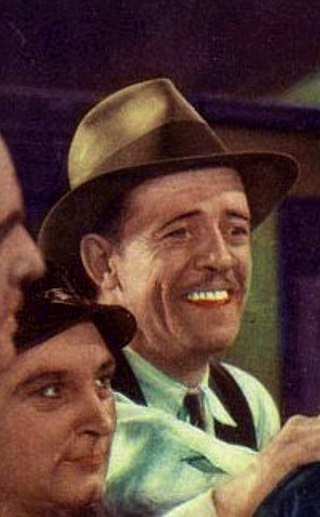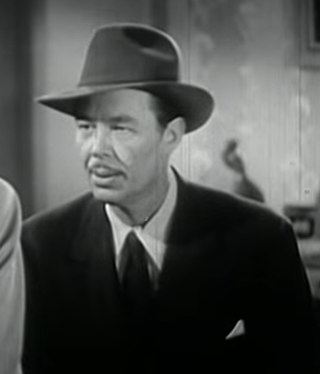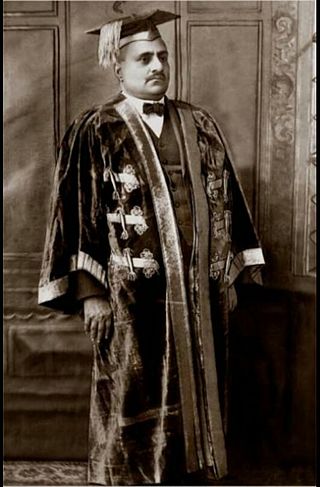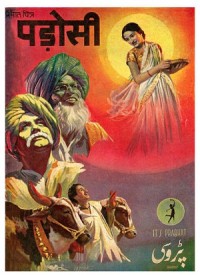Related Research Articles

George Glenn Strange was an American actor who appeared in hundreds of Western films. He played Sam Noonan, the bartender on CBS's Gunsmoke television series, and Frankenstein's monster in three Universal films during the 1940s.

Tom London was an American actor who played frequently in B-Westerns. According to The Guinness Book of Movie Records, London is credited with appearing in the most films in the history of Hollywood, according to the 2001 book Film Facts, which says that the performer who played in the most films was "Tom London, who made his first of over 2,000 appearances in The Great Train Robbery, 1903. He used his birth name in films until 1924.
Jaidev was a music composer in Hindi films, most known for his work in films: Hum Dono (1961), Reshma Aur Shera (1971), Prem Parbat (1973), Gharaonda (1977) and Gaman (1978).

Harry Lewis Woods was an American film actor.

Richard Dye, known professionally as Dick Curtis, was an American actor who made over 230 film and television appearances during his career.

General elections were held in British India in 1920 to elect members to the Imperial Legislative Council and the Provincial Councils. They were the first elections in the country's modern history.

Homi Wadia was an Indian film director and producer in Bollywood. He was the co-founder of Wadia Movietone productions, established in 1933 and later after the closure of Wadiatone, he founded Basant Pictures in 1942. In a career spanning five decades, he directed over 40 films, including Hunterwali (1935), Miss Frontier Mail (1936), Diamond Queen (1940), Shri Ram Bhakta Hanuman (1948) and fantasy film Hatim Tai (1956). He was also a founding member of the Film & Television Producers Guild of India, established in 1954. Homi Wadia was married to actress and stunt woman Fearless Nadia. Homi was the younger brother of JBH Wadia, who was himself a movie director.
Jamshed Boman Homi Wadia, commonly referred to as J. B. H. Wadia, was a prominent Bollywood movie director, screenwriter, producer and founder of Wadia Movietone Studio. He was born in prominent Parsi family which hailed from Surat, Gujarat whose ancestral business was ship building. Their family name of Wadia stands for master shipbuilders. In a family of entrepreneurs Wadia is credited with creation of movies involving populist stunt roles including those by Fearless Nadia and bringing concept of stunt actresses in Indian cinema.

Bambaiwali is a Bollywood action adventure film. It was released in 1941. The film was directed by Homi Wadia and produced by Wadia Movietone. It starred Fearless Nadia, John Cawas, Sardar Mansoor, Dalpat and Boman Shroff.

Hunterwali is a 1935 Indian Hindi-language action film by the Wadia Movietone company of Bombay, featuring Fearless Nadia as the heroine. A story of a princess who fights injustice as the masked crusader Hunterwali, the film propelled Nadia and the Wadia brothers of Wadia Movietone to fame.

Diamond Queen is a 1940 Hindi action adventure comedy film. It was directed by Homi Wadia and produced by Wadia Movietone. It starred Fearless Nadia, John Cawas, Radha Rani, Sayani Atish, Sardar Mansur, Dalpat, Kunjru, and Boman Shroff. This film was the seventh in the Diamond thriller series with the first being Veer Bharat in 1934, directed by Homi Wadia under the production of J. B. H. Wadia. It is cited as one of the best films produced by the Wadia brothers. The film's success saw Homi Wadia becoming a producer by which he was able to obtain raw stock for his films due to the rationing of two films per producer during the Second World War.

11 O'Clock is a 1948 action film directed by Homi Wadia. It starred Fearless Nadia, John Cawas, Atish Sayani and Aftab. The Austin car, which was a regular in most Fearless Nadia films, was given a billing with the main cast as "Austin Ki Bacchi". The music was composed by Chitragupta. Homi Wadia had left Wadia Movietone, having parted ways with his brother JBH Wadia and started his own film company called Basant Pictures. He was to continue with the action genre, but produced more mythological films under this banner. His co-sponsor was M. B. Billimoria, who also distributed the film.

Lutaru Lalna is a 1938 Indian Hindi-language action adventure film directed by Homi Wadia and produced by Wadia Movietone. The music was composed by Master Mohammed and Baldev Naik. The film starred Fearless Nadia, Boman Shroff, Sardar Mansoor, Sayani Atish and Sarita Devi.

Punjab Mail is 1939 action adventure Hindi film directed by Homi Wadia for Wadia Movietone. The score was provided by Madhavlal Damodar Master, and stars Fearless Nadia, John Cawas, Sayani Atish, Sardar Mansoor, Boman Shroff and Sarita Devi. The film once again had Nadia playing the avenging female with mask and whip astride a horse dispensing justice and beating up the villains.

Wadia Movietone was a noted Indian film production company and studio based in Mumbai, established in 1933 by Wadia brothers J. B. H. Wadia and Homi Wadia. It was most known for stunt, fantasy and mythological films, including Hunterwali (1935).
Khwab Ki Duniya (transl. Dreamland) is a 1937 Hindi fantasy film produced and directed by Vijay Bhatt for Prakash Pictures. The music director was Lallubhai Nayak with lyrics written by Pandit Anuj. The film starred Jayant, with costars Sardar Akhtar, Umakant, Zahur, Lallubhai, Shirin and Ismail.

State Express is a 1938 Indian Hindi-language action film directed by Vijay Bhatt for his production company Prakash Pictures. The film's music was composed by Lallubhai Nayak and the dialogues were written by Sampatlal Srivastava. Zakaria Khan, named Jayant by Vijay Bhatt, and who was to become a famous character artist, started his career as a leading man in several of Bhatt's earlier films from Bombay Mail (1935) to Bijli (1939), including State Express The film starred Jayant, Sardar Akhtar, Umakant, Lallubhai Nayak, Shirin and Ismail.

Shejari is also known as Padosi in Hindi version as. Padosi is a 1941 Indian social drama film directed by V. Shantaram. It was produced by Prabhat Film Company and the bilingual film in Marathi and Hindi was the last film Shantaram made for Prabhat before venturing to form his Rajkamal Kalamandir. The film is cited as one of the three social classics Shantaram made at Prabhat. The other two were Duniya Na Mane (1937) and Aadmi (1939). The story and dialogue were by Vishram Bedekar in the Marathi version, while the dialogues in the Hindi version were by Pandit Sudarshan, who also wrote the lyrics. The music director was Master Krishnarao. The famous character artist Radhakrishan made his acting debut in the film as a villain. The film starred Mazhar Khan, Gajanan Jagirdar, Anees Khatoon, Radha Kishan, Lajwanti, Sumitra, Gopal and Balak Ram.
References
- ↑ Crow, Jonathan (2014). "Miss Frontier Mail". Movies & TV Dept. The New York Times . Archived from the original on 2 June 2014. Retrieved 2 June 2014.
- ↑ "Miss Frontier Mail 1936" . Retrieved 2 June 2014.
- ↑ Prakash, Gyan (10 October 2010). Mumbai Fables. Princeton University Press. p. 109. ISBN 9780691142845.
- 1 2 Thomas, Rosie. "TheFilm That Mistook its Star for a Train" (PDF). WestminsterResearch. Westminster University. Retrieved 2 June 2014.
- ↑ Majumdar, Neepa (16 October 2009). Wanted Cultured Ladies Only!: Female Stardom and Cinema in India, 1930s-1950s. University of Illinois Press. p. 113. ISBN 9780252034329.
- 1 2 Kaur, Sinha (14 June 2005). Bollyworld: Popular Indian Cinema Through a Transnational Lens. SAGE Publications India. p. 55. ISBN 8132103440 . Retrieved 2 June 2014.